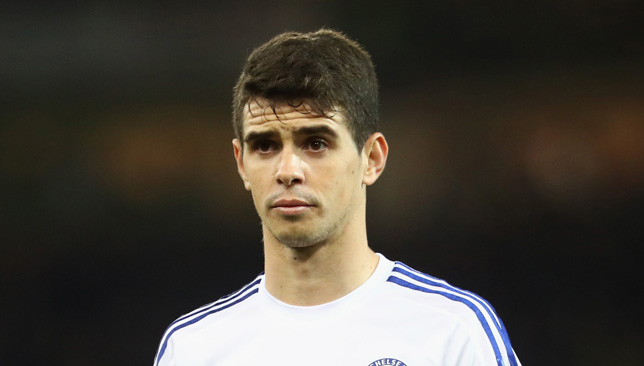
A simple statistic which illustrates the financial might of Chinese football is that five of the highest-paid players in the world now ply their trade in the country’s Super League.
Whereas before, when little-known Brazilians like Dario Conca were earning weekly six-figure sums, the game’s super wealthy now playing in the Far East are decidedly more recognisable: Carlos Tevez, Hulk, Graziano Pelle, Ezequiel Lavezzi and now Oscar.
The argument can be made that the first four are all on the downward, in terms of their career arcs – although all four would comfortably get in most teams in Europe’s top five leagues – but Oscar is something of an outlier.
At 25, he’s approaching his prime. A career that, based on the impressive ability he showed as a teenager, was supposed to mean starring for an elite Champions League club and in regular Ballon d’Or reckoning. None of those forecasts look like coming to fruition now the Brazilian has moved to Shanghai SIPG for £60m where he will earn £400,000 per week.
Both figures are of enormous significance, but it’s the latter which has attracted the most attention. Not only has it formed the basis of sneering criticism that Oscar has sold his soul for a life of empty luxury and a career unfulfilled – ignoring the fact at 25 he could realistically return to Europe and still have plenty of offer – but is also an indicator of just how narrow the transfer market is becoming for Premier League clubs.
Thank you @ChelseaFC for everything you've done for me!
— Oscar (@oscar8) December 23, 2016
Obrigado @ChelseaFC por tudo que fez por mim ! 💙💙👊🏼👊🏼 pic.twitter.com/DUxWKBztpy
As TV and commercial revenue swells the finances of England’s elite, with the addition of substantial foreign investment, their willingness to pay their players huge contracts increases and so sets in motion a domino effect.
Oscar was handed a new five-year Chelsea deal just over two years ago for a weekly wage of around £80,000. Before tax, and discounting the myriad bonuses that are attached to player’s contracts, that equates to £20.8m.
Given he was two years deep into that agreement. Oscar had undoubtedly grown used to earning that sort of money. And as a regular starter for Chelsea as well as being a Brazilian international, in the context of the Premier League market, he probably deserved it.
The global footballing landscape is widening more than ever and it’s finance, not competition, that now dictates its borders
Yet, as has become increasingly apparent over the last six months as Chelsea have desperately tried to offload him: the rest of the football world disagrees.
When you are one of the higher earners at a club as wealthy as Chelsea in the middle of a lucrative contract what, realistically, are your options? At rough count in the Premier League: Manchester City, Manchester United, Arsenal and Liverpool (although the latter two are huge maybes); but outside of England: Real Madrid, Barcelona, Bayern Munich, Juventus and Paris Saint-Germain.
That’s pretty much it – ignoring the certain finances of AC Milan and Internazionale. And when you’re a play in a position such as Oscar’s, with such a breadth of competition across the continent, does it really made sound financial sense to be spending in excess of £40m and wages beyond what he was earning at Chelsea?
Which is where the Chinese Super League steps in and the country’s desire to be a world superpower by 2050. They will happily overspend without rhyme or reason, bar the provision the player is a relative household name or international.
Oscar would undoubtedly prefer to play for a Bayer Leverkusen, Sevilla, Roma or Lyon, in the second tier of European clubs, but they don’t have the financial capabilities to match that of the selling club.
With China now a viable option, it gives the Premier League’s more lavish spenders an opportunity of offset their questionable decisions in the transfer market. Chelsea have made a considerable profit on a player they signed for £19m but who has increasingly moved to the fringes of their squad.
It may also now lead them to be even more aggressive in their pursuit of the world’s best young talent, knowing £20m on an 18-year-old from Colo Colo, on a minimal contract can become £50m once a Chinese club comes calling.
The global football landscape is changing and widening more than ever and its finance, not competition, that now dictates its borders.
Don’t blame Oscar for that.